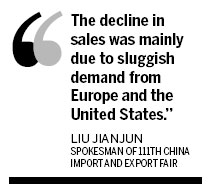
Despite a slight increase in the number of overseas buyers, the sales volume declined at China's largest trade fair, sending a gloomy signal for the export outlook.
Transactions clinched at the 111th China Import and Export Fair, which concluded on Saturday in Guangzhou, capital city of Guangdong province, totaled about $36 billion, down 4.8 percent and 2.3 percent compared with the fair's 110th and 109th sessions, sources with the fair's organizing committee said.
|
 |
The fair, also internationally known as the Canton Fair, meanwhile, has registered more than 210,000 overseas buyers from 213 countries and regions, a slight increase of 0.23 percent over the previous session.
"The decline in sales was mainly due to sluggish demand from Europe and the United States," said Liu Jianjun, the fair's spokesman.
Affected by the European debt crisis, the number of buyers and transaction from Europe decreased by 15.5 percent and 5.6 percent, respectively, Liu said.
Sales volume to US buyers also decreased by 8.1 percent compared with the last session, according to Liu.
"Buyers are still holding a cautious approach in signing long-term orders with Chinese exporters due to the global financial crisis," said Liu, who noted that about 86 percent of orders signed at the fair are short-term deals.
"Disappointed by slowing demand from Europe, we have turned to emerging markets like South America," said Cao Yunhui, exports manager of Fuxin Electronic Technology Co, a wine cooler exhibitor at the Canton Fair.
Transaction from emerging markets including the BRICS members and African countries increased by 4.1 percent and 13.5 percent, respectively, sources with the fair's organizing committee said.
Chen Feng, executive chairman of Guangdong Xinghui Auto Model Co, said the company's business in emerging markets - including Brazil, Russia, India and South Africa - has seen a dramatic increase in the past two years.
The company, based in Shantou of Guangdong province, ships its toy model cars to 47 countries and regions, with its profit in Russia, for example, increasing by 40 percent last year, according to Chen.
"Along with upgrading our products, we have been focusing on the emerging markets since the global financial crisis in 2008, when the world economy in major markets of Europe and the US has been sluggish," Chen said.
With a dramatic increase of exports to emerging markets, the company has witnessed steady business growth in recent years, with sales reaching some 440 million yuan ($70 billion) last year.
To attract more buyers from the developed markets like Europe and the US, the fair's spokeman Liu Jianjun urged Chinese companies, especially those mainly engaging in simply processing, to focus on developing their own brands and invest more in self-innovation.
"Providing high-end products catering to the EU market is the key to stabilizing export growth," Liu said.
Chinese manufacturers who have already brought new and innovative products with high added value have seen rising popularity among European buyers, Liu said.
"Besides the emerging markets, Chinese manufacturers should also turn to the domestic market to develop their sales channels," Liu said.
Contact the writer at [email protected]